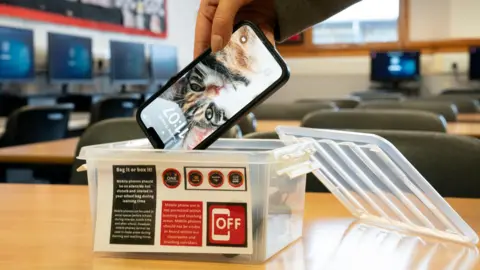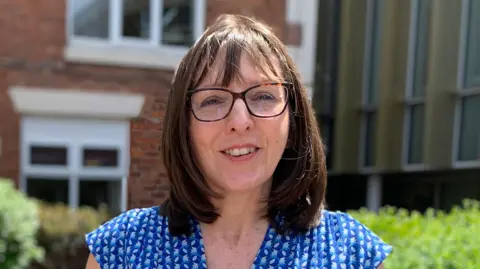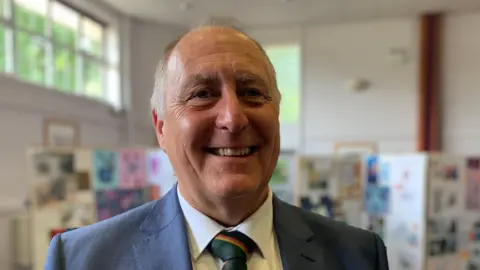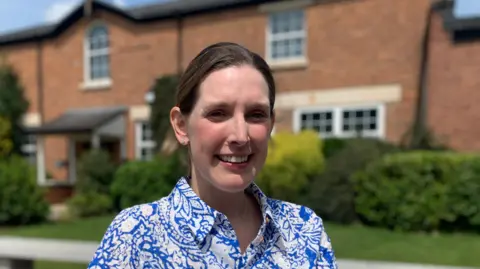School smartphone bans - are they effective?
 PA Media
PA MediaBanning smart phones in schools has become an increasingly popular move for teachers looking to improve children's education, concentration and wellbeing.
While some health and education professionals and campaigners argue the bans help improve young people's mental health, there are arguments that sanctions can make little difference, do not go far enough, or could have a negative impact.
The head teacher of one of the first schools to ban mobiles - Rebecca Mahony from Birkenhead High School Academy in Merseyside - said many parents had accepted the move.
But she told the BBC she had been told by some parents that their children were becoming anxious because they felt they were missing out.
Ms Mahony said the prohibition was "now very much part of the DNA" after its introduction in 2017 due to concerns over disruption, lower attention spans and cyber-bullying.
But she added: "There have been some really sad tales from parents actually saying my child needs their phone because they are anxious.
"But it's the complete reverse of that - they don't need their phone because that is causing their anxiety."

Sleep, classroom behaviour, exercise, and how long was spent on phones overall were also found to be no different for pupils at schools with phone bans and those without, the academics found.
However, University of Birmingham academics did find that spending longer on smartphones and social media in general was linked with worse results across all those areas.
Ms Mahony said her school's ban involved phones being locked away, which meant students were now "chatting, playing UNO, communicating".
But after a 35-year career in the education sector, she said her main concern for wider society was mobile phones' "impact on mental health".
"The anxiety levels are through the roof, we're seeing an addiction to phones," she said.
"I'm seeing children that can't communicate with one another. They can't look each other in the eye when they communicate. They're not learning the social norms. They're not learning about body language."

About 145,000 children and 14,000 schools in the UK have signed a pact to increase the age at which smartphones should be used, according to the organisers Smartphone Free Childhood.
Campaign spokeswoman Victoria Kazi, a GP, said the campaign recommended no smartphones for under-14s, and no social media for under-16s, after which age "they're more mature and able to cope with the complicatedness".
A recent conference in Wirral, held by the Smartphone Free Childhood parents network, heard from other teachers who had taken tough measures over smartphones.
Adrian Whiteley, head teacher of The Mosslands School in Wallasey, decided to start locking phones away in last year after finding children were "making excuses to go out of lessons, go to the toilet… and they'd get their phones out".
He said students now "talkED to each other at break" and the stricter policy meant the school was "helping parents" avoid succumbing to their children's requests for a smartphone.
"The child doesn't need their phone during the school day," he said.
"I think sometimes parents having conversations with their children about use of phones leads to conflict in the house.
"But by being universal and absolute in our rule about no phones, we've stopped that being a problem, because the parents know that we won't move.
"So they can say, 'Well that's what the schools say - we can't do anything about it'."
Ms Kazi said some parents were now able to say to their children "don't tell me everyone else has got a smartphone because I know about another 20 children in your year who don't".
"So it just gives you more support," Ms Kazi added.

Dr Victoria Goodyear, the lead author of the University of Birmingham study, previously told the BBC its findings were not "against" smartphone bans in schools.
"What we're suggesting is that those bans in isolation are not enough to tackle the negative impacts," she added.
She said the focus needed to be on reducing how much time students spent on their phones, adding: "We need to do more than just ban phones in schools."
A bill suggesting banning smartphones in schools and addictive algorithms aimed at young teenagers will be debated in parliament this July following widespread concerns.
Campaigners including Esther Ghey, whose 16-year-old daughter Brianna was murdered by two teenagers - one of whom had been watching violent content online – have called for social media access to be banned for under-16s.
Writer Jack Thorne, who created the recent ground-breaking drama Adolescence about a fictional killing spurred by a boy's use of social media, has also called for the government to take "radical action" similar to Australia's recent ban on under-16s from using social media.
Technology Secretary Peter Kyle has previously said he would be watching the situation in Australia "very closely".
Listen to the best of BBC Radio Merseyside on Sounds and follow BBC Merseyside on Facebook, X, and Instagram. You can also send story ideas via Whatsapp to 0808 100 2230.
